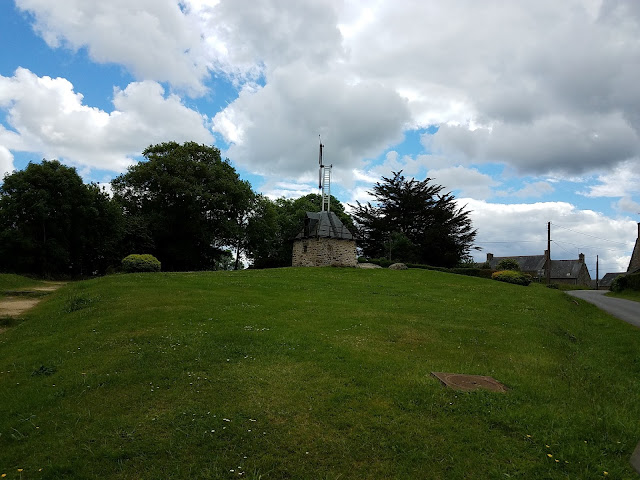The old Medina in Fez, Morocco
The Medina is the old walled city within the larger city of Fez. Many North African cities have a medina. The Medina in Fez is a very large network of small alleys, surrounded by a wall. No cars are allowed inside, making it one of the largest car-free urban areas of the world. If you want to know more check out this UNESCO World Heritage web page.
We spent a few hours in the Medina, being guided by our ex-pat friends. We were glad they knew their way around as it could have been confusing.
This first photo was taken from an overlook. Most of what you see in the photo is the medina. It's very large. We drove down to a gate at the lower end, parked and walked from there.
Our first stop was the tannery. They gave us fresh mint to hold under our noses to block the strong odor, but by the time we reached the overlook the odor was gone. It was a very comfortable day, probably about 72 degrees F. Warm in the sun and nice in the shade. Here's what we saw looking down.
Here you see on the left the area outside the Medina, where we parked, the wall and just inside it the river, where the hides are washed first.
The hides are next soaked for several days in these greenish vats. They contain ammonia made from pigeon poop. Hence the stink, but as I said it wasn't too bad up where we were. The brown and colored vats farther up were where the hides were dyed. Each man was paid by the piece, so he bought raw hides outside, then followed those hides through until they were dry and ready for resale.
We went through the shop, but I didn't buy anything. I guess this is as good a place as any to express my somewhat confused views on animal treatment. I found all this to be rather gross and the leather products very soft and nice. I realize these animals are slaughtered, which is sad, but if it weren't for this industry they would never exist. How do you weigh the animals existence for a time and slaughter against not having lived at all? These animals live outdoors. We saw many herds of sheep, goats and cattle. They looked like they were well-treated. Some of these hides are camel, but we didn't see any camels.
Next we went into a different gate of the medina and climbed through narrow lanes, twisting and turning until we reached an area where various items were being made of metal.
The man on the ground seems to be scoring the shiny metal using a template. There were other tourists here.
This is a square (the French word Place is better, because it doesn't imply a shape). Squares are hardly ever square. We walked into the narrow lane you see straight ahead. There is a sign here telling about the square in Arabic. There was an entrance to the university behind me. This is supposed to be the oldest university in the world. It's not the one where our friend works.
Beautiful gold and silver-colored objects for sale. I'm not sure what the metal was. It wasn't actually gold and silver.
This was the only shop I saw selling mirrors. They were very ornate and I couldn't resist a couple photos.
Here's a shop where they sold colored metal objects. The man in the photo is applying color to that item.
Farther down the lane.
From here we back-tracked back out to the car. Transportation in these lanes was by push cart and donkey. I tried taking pictures of the donkeys, but they moved quickly and mostly I just got their tails. Here is one carrying a roll of that shiny gold-colored metal.
We're almost back to the car now. The balcony above is where we were when we looked down into the tannery.
I think those white disks are some sort of traditional communication device. :-)
After this we drove to another gate in the medina and walked through more narrow lanes past hundreds of shops selling almost anything. Here's the gate at the entrance to this lane. The lane was narrow and crowded and apparently I didn't get any pictures of it.
Then we went to the airport and started home.
I'll try to get more blog posts up, but most of my pictures are on my husband's computer, so they weren't available to me today.


















Comments
As a Cambridge resident I can confirm that squares are rarely square.